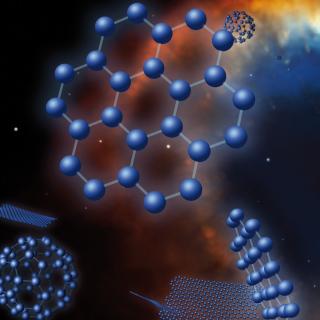Bibcode
Cox, N. L. J.; García-Hernández, D. A.; García-Lario, P.; Manchado, A.
Referencia bibliográfica
The Astronomical Journal, Volume 141, Issue 4, article id. 111 (2011).
Fecha de publicación:
4
2011
Número de citas
16
Número de citas referidas
14
Descripción
By tracing the distribution of cool dust in the extended envelopes of
post-asymptotic giant branch stars and (proto)-planetary nebulae
((P)PNe), we aim to recover, or constrain, the mass-loss history
experienced by these stars in their recent past. The Far-Infrared
Surveyor (FIS) instrument on board the AKARI satellite was used to
obtain far-infrared maps for a selected sample of post-AGB stars and
(P)PNe. We derived flux densities (aperture photometry) for 13 post-AGB
stars and (P)PNe at four far-infrared wavelengths (65, 90, 140, and 160
μm). Radial (azimuthally averaged) profiles are used to investigate
the presence of extended emission from cool dust. No (detached) extended
emission is detected for any target in our sample at levels significant
with respect to background and cirrus emission. Only IRAS 21046+4739
reveals tentative excess emission between 30'' and 130''. Estimates of
the total dust and gas mass from the obtained maps indicate that the
envelope masses of these stars should be large in order to be detected
with the AKARI FIS. Imaging with higher sensitivity and higher spatial
resolution is needed to detect and resolve, if present, any cool compact
or extended emission associated with these evolved stars.
Proyectos relacionados

Nucleosíntesis y procesos moleculares en los últimos estados de la evolución estelar
Las estrellas de masa baja e intermedia (M < 8 masas solares, Ms) representan la mayoría de estrellas en el Cosmos y terminan sus vidas en la Rama Asintótica de las Gigantes (AGB) - justo antes de formar Nebulosas Planetarias (NPs) - cuando experimentan procesos nucleosintéticos y moleculares complejos. Las estrellas AGB son importantes
Domingo Aníbal
García Hernández